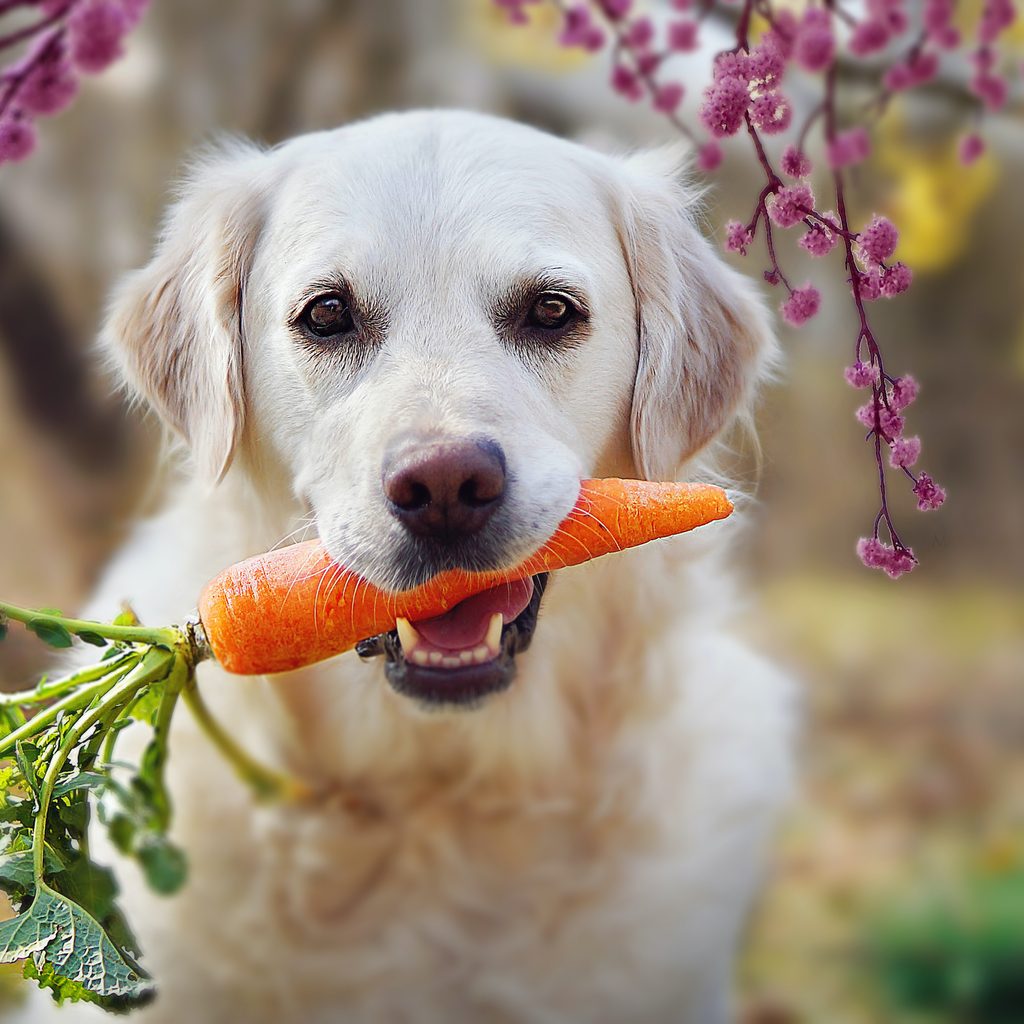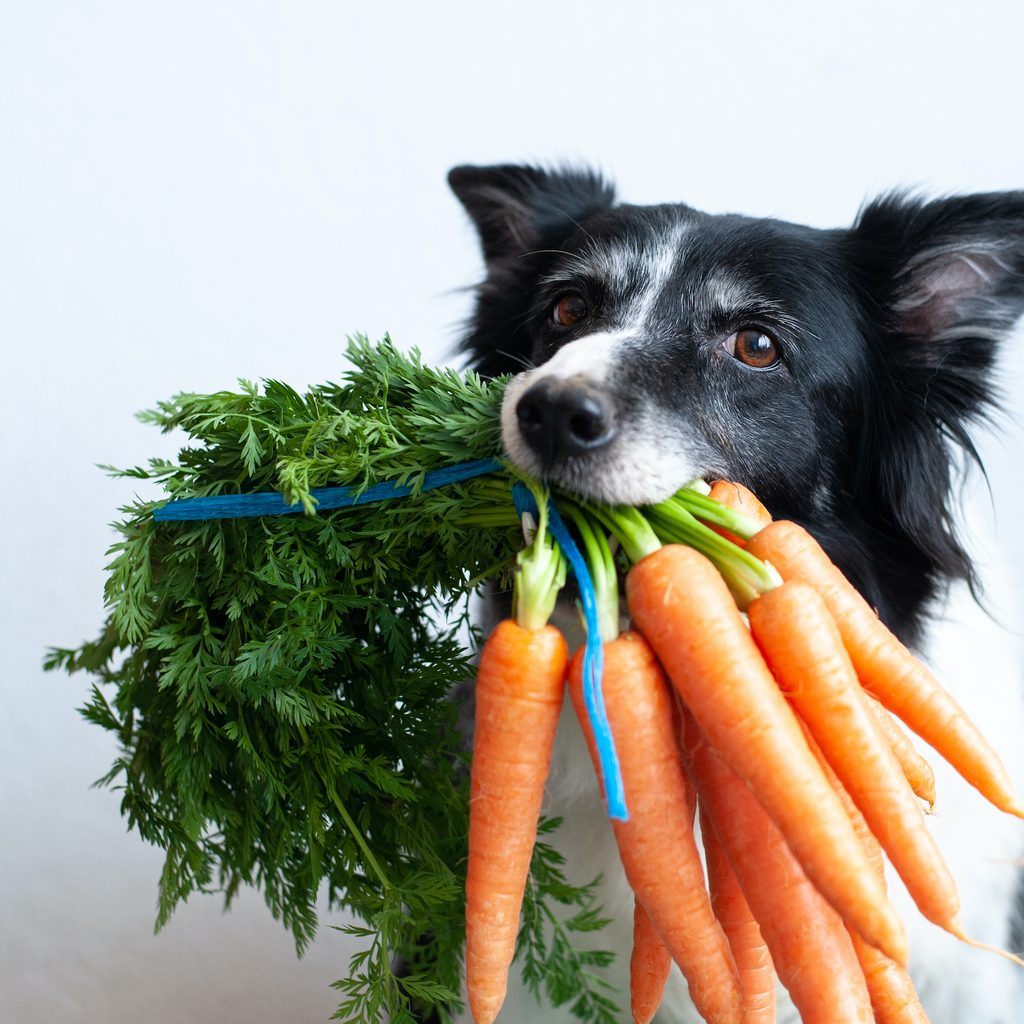Pet parents are always looking for safe people food to share with their furry friends, from meat to produce and everything in between. You’ll find some extravagant snacks and recipes for dogs available these days, but what ingredients in your home can you use?
A lot of fresh veggies are excellent sources of nutrients for pets, dogs included. One in particular — carrots — is traditionally thought of as a snack for rabbits, but pups love them, too! You can prepare this bite a few different ways for dogs, although Fido will be just as grateful to munch on a few raw baby carrots straight from the bag (washed, of course)!

Are raw carrots good for dogs?
Vets and canine experts have confirmed: Raw carrots are great snacks and add-ins for your dog’s next meal — even the leafy tops are safe to eat, states Purina. However, you should take a few precautions before serving these refreshing veggies. All carrots should be cleaned thoroughly and/or peeled. It’s smart to cut them into bite-sized pieces to avoid choking, as well, though what’s “bite-sized” depends largely on your dog. Checking in with your vet to determine how many carrots is healthy for your pup is also a smart idea.
In addition to being served raw, carrots can be cooked for your four-legged friend. No oils or seasonings, please! We’ll cover a few ways to prepare these veggies for your pup shortly.
Benefits of carrots for dogs
Carrots make a great snack for pups because they’re low in calories and high in fiber (which is essential to a balanced canine diet and healthy digestive system). When the digestive system is regulated, it can rid itself of harmful gut bacteria and other toxins even faster than before. Beta-carotene, the pigment that makes carrots orange, turns into vitamin A, another crucial component that aids in healthy vision and immune function (via AKC). As if they weren’t healthy enough, carrots also contain nutrients such as vitamin K and potassium.
Since carrots are so high in fiber, they’re a great addition to your dog’s favorite kibble or home-cooked meal. A balanced diet for a dog will consist of fiber, protein, fat, and carbohydrates. Carrots will take care of the fiber component, but you’ll need at least a few other ingredients to tie the meal together.

Carrot recipes for dogs
If you’re looking for a quick treat, chop up a few raw carrots from the fridge into small sticks or rounds — as long as they’re bite-sized! It can be fun for you to feed your dog carrots, too, if you love watching her crunch on something yummy.
Steaming or cooking carrots in the microwave is also an option, although the experts at Purina advise against boiling them if you’re concerned about nutritional value. Boiling veggies can water down some of the nutrients, through carrots prepared this way are still 100% safe for pups to eat.
Dehydrated veggie “chips” are also a chewy and safe way to serve your dog carrots. This will be easiest with a food dehydrator but can easily be done with your oven at the lowest setting. Be warned, this is a lengthy process! The thickness of the slices you cook will determine how long they need to bake, though overcooking will simply turn the chewy, jerkylike consistency crunchy. Some pups certainly prefer this!
Freeze a large carrot to make a safe and healthy chew toy for your dog. They’ll love gnawing on this tasty snack, and you’ll love that they have a distraction from getting into trouble! This is the only situation when you don’t need to cut the carrot up into bite-sized pieces before serving, though you should keep an eye on your pup while she’s snacking.
Whether your dog prefers them raw, frozen, or mixed in with her favorite kibble, carrots can be an excellent snack or mealtime staple. Some dogs love them so much, they’d be considered a treat — and what pet parent doesn’t love a healthy eater? Since carrots have so many benefits for both you and your pup, don’t hesitate to share a bite (remember, no dressings or seasoning!) next time you have a salad or veggie tray in front of you. Your pup will be sure to thank you, and so will her vet! Plus, who doesn’t love hearing their dog munch on something tasty and good for her?



